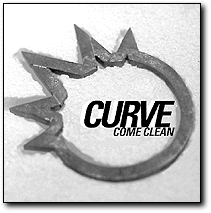![]()
![[ ARTS
]](/images/fall97/artsublogo.gif)
![]()
By Doug Levy
Arizona Daily Wildcat February 12, 1998
Coming Clean
![[Picture]](15_1_i.gif)
Images courtesy of Universal Records Toni Halliday and Dean Garcia of Curve: They're back with a vengeance and cool as ever. |
There are some moments that just stick with you.
For example: back in 1994, I walked into class one day, wearing a Curve T-shirt, only to hear someone say, "Dude, did you hear? Curve broke up."
Well, I hadn't heard and I wasn't happy. Curve was, and remains to this day, one of my favorite bands. Founding members Toni Halliday and Dean Garcia are respectively, one of the finest singers and one of the top musicians in modern music. I couldn't really accept the news, and, in fact, I never did.
I just knew Toni and Dean would be back one day.
And now they are.
Curve first stormed onto the UK music scene in 1991 with a series of brilliant EPs,
made up of songs which were years ahead of their time in their fusion of live instrumentation with sampled beats and loops.
Two albums, Doppelganger and the epic Cuckoo followed in '93 and '94, and with each new release, Curve ascended to further sonic heights.
And then, the break up. Only it wasn't break up, as I found out recently, simply a break.
Springing back into musical consciousness last year, Curve put out a limited import single, Pink Girl With The Blues, a welcome gift for the fans who never lost faith, and a sign that the future of the band could be as bright as the past.
Then there was last year's Chinese Burn EP, a preview of what to expect from Come Clean, Curve's first new album in four years, due out March 10.

Images courtesy of Universal Records Curve's unique blend of pop, rock, and space age samples will make its latest mark on musical consciousness with next month's release of "Come Clean," the third full-length album from the band. |
Having embraced their digital heritage, Toni and Dean take on a more electronic outlook than ever with Come Clean, along with a new live band, a new producer (Bomb The Bass' Tim Simenon), and a number of guest musicians, including Elastica's Justin Welch and Flood.
Hearing that they would be in L.A. this past December to do interviews, I didn't hesitate to set one up for myself and drive all the way out there from Tucson to meet them.
I found Toni and Dean at the fashionable Hotel Nikko, jetlagged and operating on little sleep, with only a week to go until Christmas and none of their shopping done yet.
However, they were as amiable as I could have hoped, and eager to talk about their new work, as well as anything else that crossed their minds.
"If we have enough coffee, we'll be all right," said Toni, laughing, as I took my seat next to her on the couch in the hotel lobby.
I asked her whether she felt the general public would be more receptive to Curve in today's more electro-friendly society.
"Well, it's funny," she said, putting down her cup, "because when we think about it now, yes, obviously . . . we didn't realize it was so ahead of it's time when we started up with Curve, because . . . in England, there were other people trying to do that thing, like Kevin Shields from My Bloody Valentine . . . they'd try to mix loops with guitars . . . and we'd sit and talk with Kevin, and he'd go like, 'The future of music is this, right?'"
"And, like, all these people around us in other bands actually, you know, trying to cross that [line], and then we'd come to America and everyone's going like, 'What?' [They] never heard anything like it."
"Now, seven years later, it's finally time they got round to this thing. But when we started up again, it was about a year and a half ago and the Prods hadn't broken America, nor had the Chemicals, and there was no Crystal Method - there was none of any of these things going on in America . . . so we didn't even know if it was the right time again. They were doing things in England, but we'd already made that mistake once before, thinking, well, if it's happening in England, then it must be happening everywhere."
If only that were the case, America would be a much better place. However, as it stands, a lot of popular UK acts meet with only lukewarm responses from American audiences. Because of this, some of them don't want to spend too much time touring here, or working the American market.
Dean feels differently. "We think quite the opposite, actually," he said. "We feel that America's our patch, really, and we're going to go for it over here. We want to do it. We find that very exciting, actually, in the wake of what's gone and what we can do, you know, and the way people respond."
"But also, on top of it," added Toni, "America's completely set up, on a service level, so it's a lot easier to tour in America . . . . I find England and Europe more depressing for touring than America."
Dean nodded. "Definitely."
In fact, they already three American tours planned to support the album: a smaller, major market tour, followed by a larger more inclusive one, and then a major tour, with a big act on the bill - they wouldn't elaborate on who it might be, though.
"Well, soon as you say things like that, it doesn't happen," Dean explained.
"You gotta sign the contract and then you can go, 'Yeah,'" said Toni.
Of course, playing live was one of the big worries with coming back after such an extended musical sabbatical. The band played a show last fall at King's College in London as a bit of a test. "It was our first gig, for three and a half years, or something like that," Dean added.

Photo courtesy of Universal Records Toni and Dean: the masterminds behind the music. |
"We've seen bands be born and die in that time," said Toni, "so you never know. And, of course, it completely sold out and we could have sold it four times over - the agent came in and said the demand for tickets was four times the size of the venue."
However, not everything went off so well as the ticket sales; although the band played a suprisingly confident new set, things got a little soggy when the building's fire alarm went off in the middle of the show.
"It was total chaos," said Toni, covering her face, "cause we were, like, on the seventh fucking floor. And also, there was, like, seven hundred people in there who had to walk down seven flights of stairs and stand on the other side of the pavement from the venue, and they all waited, really patiently, in the freezing cold and rain and everything. And then, when we get back into the venue, of course, in a fire drill the lifts don't work, and everyone, seven hundred people, traipsed up seven flights of stairs to get back in."
The show must go on, though, and Curve was not about to disappoint their drenched devoted. "We just jumped right back in," Toni said, smiling. "We thought, if they can be bothered to do that, then we gotta do it right."
Musically, no one has ever really been able to pin Curve down. Their lush soundscapes are certainly in a field of their own and there's no real formula one can apply to their work. Bands like Garbage took some of the poppier elements of the Curve sound and brought them to the world at large, but for the most part, Curve is not something you can define: "We don't like to say we're gonna do it all like this," said Dean, "or we're gonna do it like this, you know - it's like, whatever comes out really."
"It's kind of hard - we just don't want to be pigeonholed, really," continued Toni, following his thought. "And at the minute that happens, which it will happen, we'll change."
So, I had to know, what was the real story behind the break-up that wasn't really a break-up? Toni was more than happy to fill me in.
"Well, we didn't break up," she said. "We just stopped. We just jumped off. I mean, it was just getting too much, that whole kind of, like, boring twat stuff. It was like, this is what bands do: they make a record and then they tour, and then they make a record and then they tour, and it just gets so boring."
"You end up making records that [you don't like]," put in Dean, "because you've got a schedule . . . so much pressure, and it was never really about that when we started. We took our time to do it and that was it. When it was done, that was when we felt really good about it."
Toni leaned back and lit a cigarette, looking thoughtful. "You know," she said, "I think people are just scared of dropping out of public life, in a way. To me, it's a really brave thing to do, and more bands should fucking do it; they make too many fucking records. The quality of recording today is completely dictated by business, rather than art.
"It takes a long time to make a good record. If artists spent longer doing that, there would be less records, but of better quality, and the whole standard of music would rise."
Come Clean is out on Universal Records, March 10.



